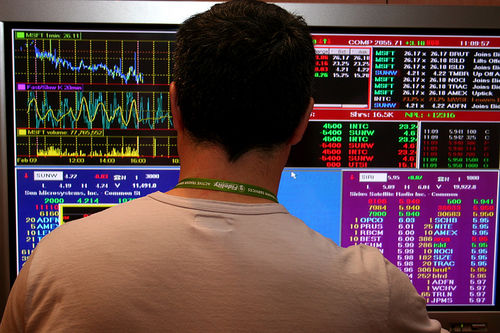June 23 (Bloomberg) -- The Greek crisis has all the
elements that dogged Russia during its 1998 default, according
to Sergei Ulatov, the resident World Bank economist in Moscow.
“The Greece example reminds me very much of what was
happening in Russia in 1998, but on a much larger scale,” Ulatov
said in an interview during the Russia and CIS Capital Markets
Forum organized by Euromoney in London today.
Greece is struggling to convince investors it can keep its
finances intact as European officials scramble to put together a
second bailout package for the debt-strapped nation. Greek Prime
Minister George Papandreou earlier this week won a vote of
confidence, bolstering his new government’s chances of pushing
through austerity measures to secure further financial aid.
Failure to secure the aid would push Greece to the brink of
default, with the country needing the funds to cover 6.6 billion
euros ($9.3 billion) of maturing bonds in August. European
finance ministers said earlier this week they would hold off on
approving a 12 billion-euro payment to the country promised for
July until passage of the plans to cut the budget deficit and
sell state assets.
Russia defaulted on bonds in 1998, when failure to repay
$40 billion worth of local-currency debt caused the ruble to be
devalued by 70 percent in two weeks and the economy to contract
by 5.3 percent that year.
Ulatov, like some of the other participants of the forum,
said he expects a Greek default.
Too Big to Fail
“I don’t see any alternatives,” said Alexander Morozov,
chief Russia and CIS economist for HSBC Holdings Plc.
Zdenek Turek, president of Citibank’s CIS division, said
European nations maybe postponing the pain. With a Greek
default, the “sooner the better,” he said.
European leaders have sought to present a common front to
avoid a Greek default. Germany’s attempt to demand a
“substantial” participation from bondholders, which would have
effectively been a default according to credit rating companies,
met pushback from the European Central Bank and France, the
country most exposed to Greek debt. German Chancellor Angela
Merkel dropped the idea of a compulsory Greek debt exchange on
June 17.
At a Brussels summit tonight and tomorrow, European leaders
will debate the size of new loans to the Athens government and
how to get holders of Greek bonds to chip in.
“It begins from the notion that Greece is too large to
fail,” the World Bank’s Ulatov said. “Then, there is an
international consensus that we need to come up with a package,
but there is a lot of moral hazard involved.”
“Some private investors, even though they think it’s going
to fail, push this package so they can exit,” he said. “Some
big investment banks just want this package so they can exit.”
elements that dogged Russia during its 1998 default, according
to Sergei Ulatov, the resident World Bank economist in Moscow.
“The Greece example reminds me very much of what was
happening in Russia in 1998, but on a much larger scale,” Ulatov
said in an interview during the Russia and CIS Capital Markets
Forum organized by Euromoney in London today.
Greece is struggling to convince investors it can keep its
finances intact as European officials scramble to put together a
second bailout package for the debt-strapped nation. Greek Prime
Minister George Papandreou earlier this week won a vote of
confidence, bolstering his new government’s chances of pushing
through austerity measures to secure further financial aid.
Failure to secure the aid would push Greece to the brink of
default, with the country needing the funds to cover 6.6 billion
euros ($9.3 billion) of maturing bonds in August. European
finance ministers said earlier this week they would hold off on
approving a 12 billion-euro payment to the country promised for
July until passage of the plans to cut the budget deficit and
sell state assets.
Russia defaulted on bonds in 1998, when failure to repay
$40 billion worth of local-currency debt caused the ruble to be
devalued by 70 percent in two weeks and the economy to contract
by 5.3 percent that year.
Ulatov, like some of the other participants of the forum,
said he expects a Greek default.
Too Big to Fail
“I don’t see any alternatives,” said Alexander Morozov,
chief Russia and CIS economist for HSBC Holdings Plc.
Zdenek Turek, president of Citibank’s CIS division, said
European nations maybe postponing the pain. With a Greek
default, the “sooner the better,” he said.
European leaders have sought to present a common front to
avoid a Greek default. Germany’s attempt to demand a
“substantial” participation from bondholders, which would have
effectively been a default according to credit rating companies,
met pushback from the European Central Bank and France, the
country most exposed to Greek debt. German Chancellor Angela
Merkel dropped the idea of a compulsory Greek debt exchange on
June 17.
At a Brussels summit tonight and tomorrow, European leaders
will debate the size of new loans to the Athens government and
how to get holders of Greek bonds to chip in.
“It begins from the notion that Greece is too large to
fail,” the World Bank’s Ulatov said. “Then, there is an
international consensus that we need to come up with a package,
but there is a lot of moral hazard involved.”
“Some private investors, even though they think it’s going
to fail, push this package so they can exit,” he said. “Some
big investment banks just want this package so they can exit.”

No comments:
Post a Comment